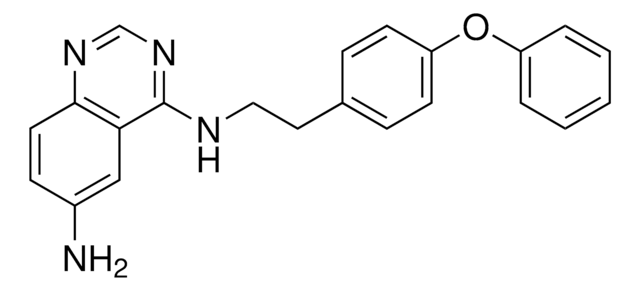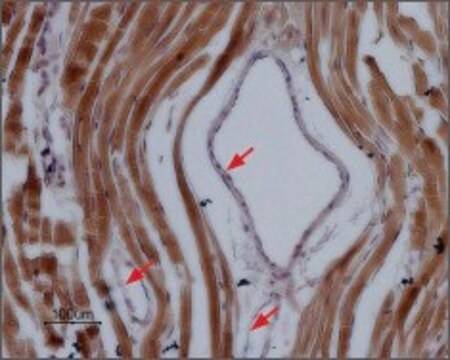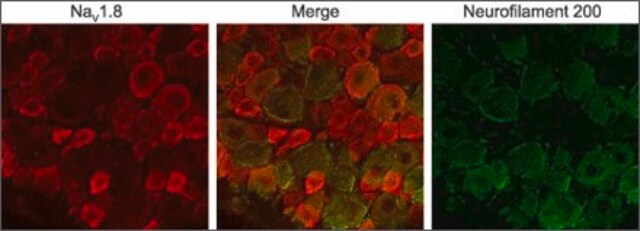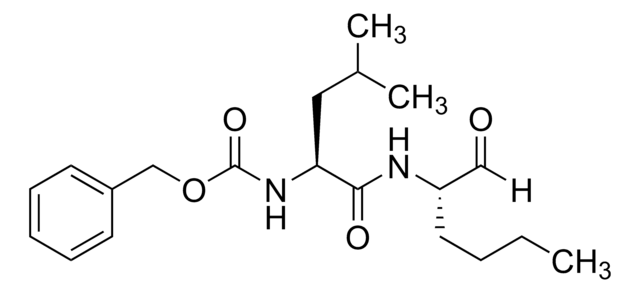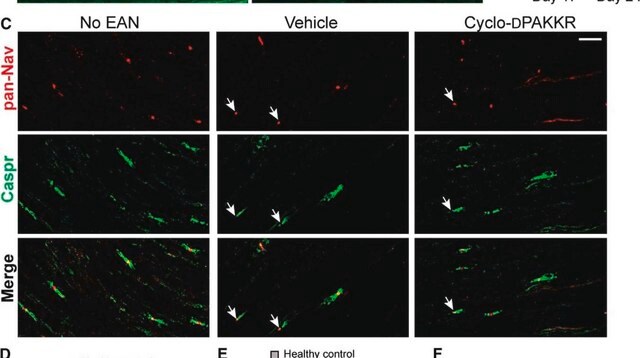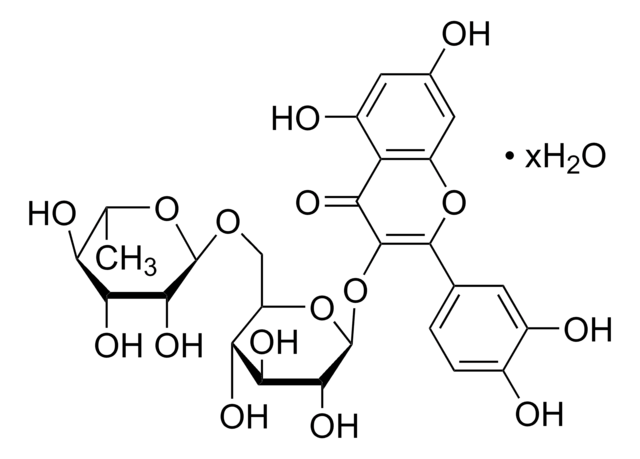S0819
Anti-Sodium Channel NaV1.5 antibody produced in rabbit
affinity isolated antibody, lyophilized powder
Sinonimo/i:
Anti-SKM2, Anti-Scn5a
Autenticatiper visualizzare i prezzi riservati alla tua organizzazione & contrattuali
About This Item
Prodotti consigliati
Origine biologica
rabbit
Livello qualitativo
Coniugato
unconjugated
Forma dell’anticorpo
affinity isolated antibody
Tipo di anticorpo
primary antibodies
Clone
polyclonal
Stato
lyophilized powder
Reattività contro le specie
rat
tecniche
western blot: 1:200 using rat heart membranes
N° accesso UniProt
Temperatura di conservazione
−20°C
modifica post-traduzionali bersaglio
unmodified
Informazioni sul gene
human ... SCN5A(6331)
mouse ... Scn5a(20271)
rat ... Scn5a(25665)
Categorie correlate
Descrizione generale
SCN5A (sodium voltage-gated channel α subunit 5) codes for an α subunit of the cardiac sodium channel (NaV1.5). It is located on human chromosome 3p22.2.
Immunogeno
peptide corresponding to amino acid residues 493-511 of rH1 (Accession P15389). This epitope is identical in mouse and highly homologous in human (17/19 residues identical).
Applicazioni
Anti-Sodium Channel NaV1.5 antibody produced in rabbit has been in immunoblotting and immunofluorescence.
Azioni biochim/fisiol
SCN5A (sodium voltage-gated channel α subunit 5) regulates the movement of sodium ions into cells, which helps in the production and diffusion of electrical impulses. SCN5A mutations results in the loss or gain of sodium channel activity and cause several cardiac diseases like Brugada syndrome, Long QT syndrome type 3, Sick sinus syndrome and progressive familial heart block.
Stato fisico
Lyophilized at ~0.8 mg/mL in phosphate buffered, pH 7.4, containing 1% bovine serum albumin, and 0.05% sodium azide.
Esclusione di responsabilità
Unless otherwise stated in our catalog or other company documentation accompanying the product(s), our products are intended for research use only and are not to be used for any other purpose, which includes but is not limited to, unauthorized commercial uses, in vitro diagnostic uses, ex vivo or in vivo therapeutic uses or any type of consumption or application to humans or animals.
Non trovi il prodotto giusto?
Prova il nostro Motore di ricerca dei prodotti.
Codice della classe di stoccaggio
11 - Combustible Solids
Classe di pericolosità dell'acqua (WGK)
WGK 3
Punto d’infiammabilità (°F)
Not applicable
Punto d’infiammabilità (°C)
Not applicable
Scegli una delle versioni più recenti:
Possiedi già questo prodotto?
I documenti relativi ai prodotti acquistati recentemente sono disponibili nell’Archivio dei documenti.
Na v1.4 and Na v1.5 are modulated differently during muscle immobilization and contractile phenotype conversion
Rannou F, et al.
Journal of Applied Physiology, 111(2), 495-507 (2011)
Selective Connexin43 Inhibition Prevents Isoproterenol-Induced Arrhythmias and Lethality in Muscular Dystrophy Mice
Gonzalez JP, et al.
Scientific Reports, 5 (2015)
Hiroki Takanari et al.
Cardiovascular research, 111(4), 410-421 (2016-07-01)
In healthy hearts, ventricular gap junctions are mainly composed by connexin43 (Cx43) and localize in the intercalated disc, enabling appropriate electrical coupling. In diseased hearts, Cx43 is heterogeneously down-regulated, whereas activity of calmodulin/calcium-calmodulin protein kinase II (CaM/CaMKII) signalling increases. It
Liang Guo et al.
Toxicological sciences : an official journal of the Society of Toxicology, 123(1), 281-289 (2011-06-23)
Improved in vitro systems for predicting drug-induced toxicity are needed in the pharmaceutical and biotechnology industries to decrease late-stage drug attrition. One unmet need is an early screen for cardiotoxicity, which accounts for about one third of safety-based withdrawn pharmaceuticals.
Exome Sequencing Identifies Compound Heterozygous Mutations in SCN5A Associated with Congenital Complete Heart Block in the Thai Population
Thongnak C, et al.
Disease Markers (2016)
Il team dei nostri ricercatori vanta grande esperienza in tutte le aree della ricerca quali Life Science, scienza dei materiali, sintesi chimica, cromatografia, discipline analitiche, ecc..
Contatta l'Assistenza Tecnica.
